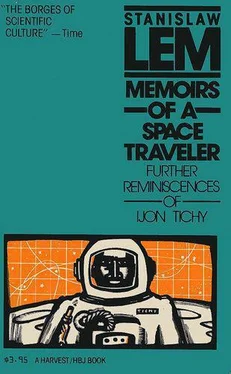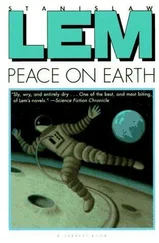As we know, cranks and eccentrics are not confined to any one time. In our day, too, there is no lack of them. From their ranks come individuals who proclaim theses contrary to common sense and prevailing opinion. One Cathodius Mattrass, a self-educated philosopher and born fanatic, founded the school of the so-called cyber-nophiles, which proclaimed the doctrine of cyber-nethics. According to this, the human race was intended by the Creator to serve as a kind of scaffolding, to be a means, a tool — for the creation of electrobrains more nearly perfect than itself. Mattrass’s sect believed that the continued vegetation of the human race was a misunderstanding. The sect founded an order that devoted itself to the contemplation of electrical thought and did what it could to give refuge to robots in trouble. Cathodius himself, dissatisfied with the results of his endeavors, decided to take a radical step toward robots’ liberation from human bondage. After consulting a number of eminent attorneys, he procured a rocket and flew to the nearby Crab Nebula. In empty regions frequented only by cosmic dust, he carried out unknown projects. Then the incredible affair of his heirs-successors came to light.
On the morning of August 29 all the papers carried this mysterious item: “Message from PASTA COSPOL VI/221: object measuring 520 mi x 80 mi x 37 mi discovered in Crab Nebula. Object executing movements similar to breast stroke. Further investigation in progress.”
The afternoon editions explained that the cosmic police patrol ship VI/221 had detected, at a distance of six light-weeks, a “man in the nebula.” Closer examination revealed that the “man” was a giant many hundreds of miles long and possessing a torso, head, arms, and legs, and that it was moving through a rarefied dust medium. Upon sighting the police ship, the giant first waved, then turned away.
Radio contact was soon established with the thing. It stated that it was the former Cathodius Mattrass, that after arriving two years ago at this place, it — he — had remade himself into robots, using, in part, the raw materials of the vicinity, and that in the future he would slowly but continually increase in size, because this suited him, and he asked to be left alone.
The commander of the patrol, pretending to take this statement at face value, concealed his ship behind a passing swarm of meteors. After a while he observed that the gigantic pseudo-human was gradually beginning to divide into much smaller pieces, each no larger than an average person, and that these parts or individuals were uniting to form something like a small round planet.
Coming out of hiding then, the commander asked the alleged Mattrass, by radio, what this spherical metamorphosis meant, and, also, what exactly was he — robot or human.
Mattrass replied that he assumed whatever shape he pleased, that he was not a robot, having arisen from a human, nor human, having rebuilt himself in robot form. He refused to give further explanations.
The case, to which the press gave considerable attention, gradually turned into a cause célèbre , because ships passing the Crab picked up snatches of radio conversations conducted by the so-called Mattrass; in these, he referred to himself as “Cathodius Sub One.” It seemed that Cathodius Sub One — or Mattrass — was speaking to others (other robots?) as if conversing with his own hands and feet. The chatter in the region about Cathodius Sub One suggested that what one had here was a government established by either Mattrass or his robot derivatives. The State Department made a thorough investigation of the situation. The patrols reported that at times a metal sphere, at times a humanoid creature five hundred miles in length, was moving through the nebula, that it was speaking to itself about this and that, but concerning its statehood it gave evasive answers.
The authorities decided to put an immediate stop to the usurper’s activity, but since the action would be (had to be) official, it was necessary to give it a name. Here the first obstacles arose. The MacFlacon Act, an annex to the civil code, dealt with movable property. In effect, electronic brains are considered movables, even when lacking legs. But here was a body the size of a planetoid in a nebula, and celestial bodies, though moving, are not considered movables. The question then came up whether or not a planet could be arrested; whether an assemblage of robots could be a planet; and, finally, whether this was one dismountable robot or a robot multitude.
Mattrasa’s legal adviser appeared before the authorities and submitted to them a statement from his client in which the latter declared that he was setting out for the Crab Nebula to transform himself into robots.
The initial interpretation of this datum, offered by the legal section of the State Department, went as follows: Mattrass, transforming himself into robots, had thereby destroyed his living organism and thus committed suicide. Which act was not punishable. The robot or robots that were a continuation of Mattrass, however, had been fabricated by the said individual and were therefore his property, and therefore now, after his demise, ought to devolve to the Treasury, since Mattrass had left no heir. On the basis of this decision, the State Department dispatched a bailiff to the nebula with the order to seize and seal everything he found there.
Mattrass’s lawyer appealed, maintaining that the decision’s acknowledgment of Mattrass’s continuation ruled out suicide, because a person who continues exists, and if he exists, he has not committed suicide. Hence there were no “robots the property of Mattrass” but only Cathodius Mattrass, who had altered himself as he saw fit. Bodily alterations were not and could not be punished; nor was it lawful to impound the parts of a person’s body — be they gold teeth or robots.
The State Department disagreed: from such an interpretation it followed that a living creature, in this instance a human being, could be built from obviously dead parts — robots. Then Mattrass’s lawyer submitted to the authorities the deposition of a group of prominent physicists at Harvard, who testified unanimously that every living organism, the human organism included, is built of atomic particles, and these can only be regarded as dead.
Seeing that the case was taking a disturbing turn, the State Department gave up its attack on “Mattrass and successors” from the physio-biological standpoint and returned to the original decision, in which the word “continuation” was replaced by the word “product.” The lawyer thereupon presented in court a new Mattrass statement, wherein the latter declared that the robots were in reality his children. The State Department demanded that adoption papers be produced — a ruse, since adoption of robots was not permitted by law. Mattrass’s lawyer explained that actual paternity, not adoption, was the issue. The Department said that regulations required that children, to so qualify, have a father and a mother. The lawyer, prepared for this, added to the record the letter of one electrical engineer Melanie Fortinbras, who revealed that the birth of the parties in question had occurred in the course of her close collaboration with Mattrass.
The State Department questioned the nature of that collaboration as lacking “natural parental features.” “In the aforementioned case,” declared the government report, “one may speak of paternity or maternity in a figurative sense only, for the parentage involved is mental; whereas statutes require, for family law to come into effect, physical parentage.”
Mattrass’s lawyer demanded an explanation of how mental parentage differed from physical, and asked on what grounds the State Department regarded Cathodius Mattrass’s union with Melanie Fortinbras as lacking physicality with respect to procreation.
Читать дальше












